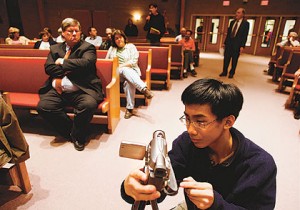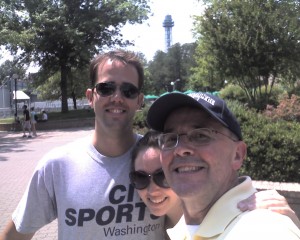 For most sane people, Summertime is Vacationtime; for legislators, it’s Conferencetime. (For Virginia legislators, of course, it’s Conferencetime and SpecialSessiontime.)
For most sane people, Summertime is Vacationtime; for legislators, it’s Conferencetime. (For Virginia legislators, of course, it’s Conferencetime and SpecialSessiontime.)
This weekend I was able to break away from the doldrums of the transportation wheel-spinning in Richmond to attend the Democratic Leadership Council’s “National Conversation” in my hometown of Chicago. The DLC describes itself as a “reform movement that is reshaping American politics by moving it beyond the old left-right debate.” It provided much of the intellectual firepower for the Clinton presidency, and, with the Obama-Clinton primary season just concluded, I was concerned that I would see evidence of  lingering animosity among former Clinton partisans. But that wasn’t the case: at least in public, all the participants were looking forward to the promise and potential of an Obama presidency.
Coming on the heels of our Indecision 2008 in Richmond, one session seemed particularly pertinent: it was a discussion of nonpartisan redistricting, highlighted by a DLC study on the impact of gerrymandering. On a policy level, gerrymandered districts lead to the gridlock we’re experiencing in Richmond. The report, which focuses on gerrymandering of Congressional districts, notes, “In large measure, today’s stalemate is the result of partisan gerrymandering. The boundaries that separate districts hew to the partisan advantage of one party or the other, encouraging members of Congress to play to their party’s base, rather than the broad center of the electorate.”
Coincidentally, the same theme was picked up locally this weekend by Richmond savant Jeff Schapiro, who (in the course of prematurely proclaiming the irrelevancy of Governor Kaine) observed, “Redistricting only makes it easier for Kaine’s opponents to resist him. Nowhere is this more evident than in the House, where a Republican majority, though reduced, endures because of the artful manner in which it drew districts in 2001. . .Republicans created, in effect, minority districts wherein narrow bands of the electorate, often anti-tax conservatives, have disproportionate influence. The key to winning and holding such House seats: sucking up to the right. It’s not always a pretty sight, but survival compels it.”
The DLC study also analyzes the impact of gerrymandered districts (at the Congressional level) on decreased voter participation. The basic idea is simple: if you don’t think your vote matters, because the lines are drawn to guarantee either the victory or the defeat of your favored candidate, you’re less likely to bother to vote. By the study’s reckoning, Virginia was the fourth least competitive state at the Congressional level in 2002 (after Massachusetts, Arkansas, and Nebraska). That ranking is perverse testament to the skill of our partisan line drawers in the previous year’s redistricting.
By 2006 (due largely, I think, to demographic shifts within the state), our ranking had dropped — or risen, depending on how you look at it — to 17th in the nation. (Iowa, which is the model of nonpartisan redistricting nationwide, was among the most competitive states in both years.)
Â
Â

